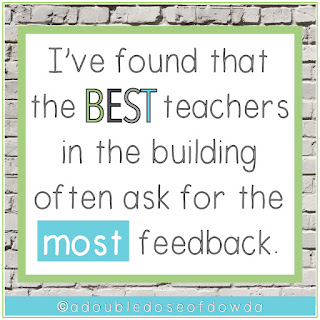It is common for instructional coaches to provide feedback for teachers after classroom observations.
But it can be an awkward conversation if you start giving feedback the teacher isn't ready to receive. That's why "Bless, Address, and Press" is such an important skill to have among your instructional coaching strategies.This post talks about one type of feedback, "Press," that you can provide to teachers in order to push them to grow and improve teaching and learning.
You can certainly use some of these things as a classroom teacher to give effective feedback to students. In this post, however, we are specifically talking about what that looks like for instructional coaching.
This post contains affiliate links. As an Amazon Associate, I earn from qualifying purchases. If you choose to purchase after clicking a link, I may receive a commission at no extra cost to you.
What to look for in this post:
If you prefer to hear us talk through this, here is a video featuring all of this content:
What to look for in this post:
- Instructional coach feedback: Press
- How to choose what to press following a classroom observation
- Moving forward in the instructional coaching relationship after providing Press feedback
- The difference between being a classroom teacher and a school teacher
- What to do if a teacher does not want to be pressed
If you prefer to hear us talk through this, here is a video featuring all of this content:
[1:12] Instructional coach feedback: Press
When a teacher requests “Press” feedback, it means they are open to learning and growing in any area. They want feedback on anything in order to help them improve as a teacher. It is wide open.[1:29] How to choose what to press following a classroom observation
During an observation, you may think of several things you could potentially press. Sometimes it can be hard to choose what to focus on together. If I can, I try to pinpoint something that will help them for their evaluation rubric. I know certain areas, like questioning or pressing students on their thinking, can be a struggle for teachers when they are being evaluated. Those can be easy areas to select in order to help them grow. In addition, they are often motivated to grow in those areas that are linked to their evaluations.Another piece that I will sometimes focus on with teachers is whatever will have the most impact on student learning. This feedback gives teachers the most bang for their buck.
[3:03] Moving forward in the instructional coaching relationship after providing Press feedback
I find that the best teachers in the building are often the ones who ask for Press feedback, because they are open and willing to put in the time and work in order to grow. They are self-reflective, and they will take this feedback and run with it.There is often healthy competition among teachers, and if they see you as a coach working with the best teachers then they will want to improve as well. If that is part of the culture of the building, everybody should want to grow.
Sometimes, providing Press feedback leads to a coaching cycle based on that area. Especially when working with top teachers, another thing I do is try to build up leadership in those teachers within the building. Perhaps they can become experts in whatever it is that we are talking and learning about together, and then I can include them in other professional learning opportunities for others as the year goes on. There are often many topics I want to cover, but there is not enough of me to go around. I can then tap those teachers and ask them to lead certain things for other teachers, and others will start to see them as leaders as well. I think that is one of the greatest gifts that I can give to a teacher. They will become even more competent in that area after teaching it to others.
[5:37] The difference between being a classroom teacher and a school teacher
In his book, The Innovator's Mindset, George Couros talks about the difference between being a classroom teacher and a school teacher. A classroom teacher does excellent things in his or her classroom, but a school teacher helps other teachers so they can help more students than the ones in his or her classroom. That can add so much value to a school if you can be part of building up teacher leadership in your building.[6:21] What to do if a teacher does not want to be pressed
At times, you may find yourself in a situation as an instructional coach where a teacher has asked for Press feedback but you realize during your conversation that they do not really want that.I worked with a teacher who told me that she loved feedback, but I discovered what she really loved was praise. Given license to give feedback on anything, the teacher was not receptive to my ideas. I did go back the next day and apologize to that teacher, stating that I did not feel good about how we left things. I reassured her that I thought she was a fantastic teacher, and I shared positive feedback about what I saw as well. I was able to recover the relationship, but I think this is all the more reason to go into an observation knowing exactly what type of feedback the teacher is hoping to receive.
Check out these related posts:
Giving Students Feedback: Bless, Address, and Press
Types of Feedback for Instructional Coaching: Bless
Types of Feedback for Instructional Coaching: Address
Check out these related YouTube videos:
Effective Feedback for Students: Bless, Address, and Press
“Bless” Coaching Feedback
“Address” Coaching Feedback



No comments
Post a Comment